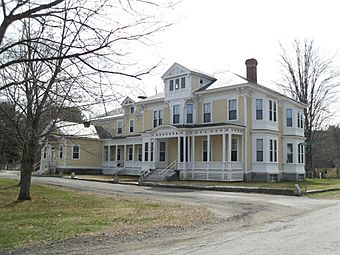Drewsville Mansion facts for kids
Quick facts for kids |
|
|
Drewsville Mansion
|
|
 |
|
| Location | Old Cheshire Trnpke., S end of Drewsville Village common, Walpole, New Hampshire |
|---|---|
| Area | 3 acres (1.2 ha) |
| Built | 1880 |
| Architect | William P. Wentworth |
| Architectural style | Stick/eastlake |
| NRHP reference No. | 96000953 |
| Added to NRHP | September 13, 1996 |
The Drewsville Mansion is a special old house located in the small village of Drewsville, which is part of Walpole, New Hampshire, in the United States. This historic home was built in 1880. It's quite unique because it shows off a building style called Stick/Eastlake style architecture. This style isn't very common in that area, especially since most other buildings nearby are much older. Because of its unique design and history, the Drewsville Mansion was added to the National Register of Historic Places in 1996.
Contents
What does the Drewsville Mansion look like?
The Drewsville Mansion stands out at the southern end of the village green in Drewsville. It's on the east side of a road called Old Cheshire Turnpike.
How big is the house?
This house is a large, sprawling building made of wood. It has two and a half stories. The outside is covered with overlapping wooden boards called clapboards. The roof slopes upwards from all sides, a style known as a hip roof.
What are its special features?
The front of the house has a single-story porch that offers shelter. This porch is decorated with a fancy, cut-out design called a jigsaw-cut decorative frieze. Above the main entrance, a part of the second story sticks out over the porch. This section has cool decorative stickwork and curved brackets, which are supports that look like they're holding up the bay.
What's inside the mansion?
Even though the house was divided into apartments at one point, and one part had some fire damage, much of its original inside look is still there. This means you can still see many of the old details and finishes from when it was first built.
Who built the Drewsville Mansion and when?
The Drewsville Mansion was built in 1880. It was created for a couple named Bolivar and Sarah Lathrop Lovell.
Who designed this unique house?
It's believed that the house was designed by an architect named William P. Wentworth from Boston, Massachusetts. He also designed a few other similar Stick-style buildings in Walpole around the same time.
Who were the Lovells?
Sarah Lathrop Lovell's father was an important person in Drewsville. He worked as a local sheriff, managed the post office, and ran a hotel. He was also one of the wealthiest people in the village. Bolivar Lovell's father was a well-known lawyer and businessman from Alstead, New Hampshire.
What happened to the house later?
The Lovell family owned the mansion until 1910, when their daughter sold the property. In the middle of the 20th century, the large house was divided into smaller apartments.
 | Kyle Baker |
 | Joseph Yoakum |
 | Laura Wheeler Waring |
 | Henry Ossawa Tanner |

